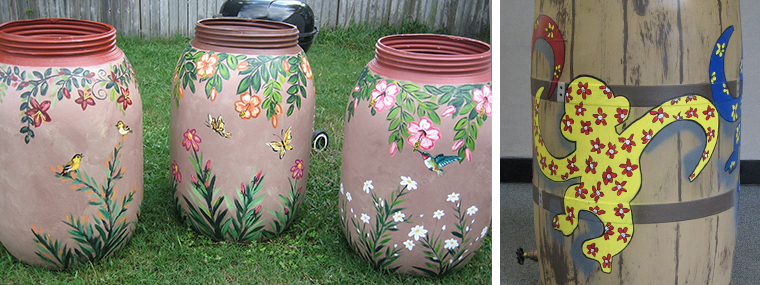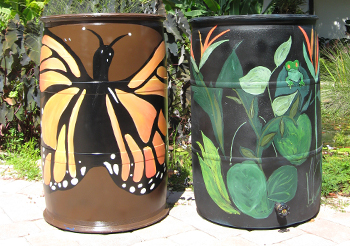
CA Gardener: Rainwater Harvesting
by Lynn Barber / Published Sept 2015

If you haven’t attended a rainwater harvesting workshop at your local University of Florida/Institute of Food and Agricultural Sciences (UF/IFAS) County Extension Service, you should! It’s that time of year again when the rains commence, and we can most certainly take advantage of the season. Rainwater harvesting is a great way to capture and utilize this free resource.
Many UF/IFAS Extension offices offer rainwater harvesting workshops where participants learn how to safely and correctly set up their rain barrel, connect more than one barrel, and install overflow accommodations. Instructions regarding safety considerations, maintenance, and painting barrels are also presented. In Hillsborough County, the workshops are free to Hillsborough County residents. Some counties charge for these workshops, so check with your county to determine whether there is a fee.
 Rain barrels and cisterns are devices that collect rainwater used mainly for landscape irrigation. These devices reduce stormwater runoff and erosion because they catch and contain it. Rain barrels and cisterns decrease the amount of potable water used for landscape irrigation because you use the water you capture to irrigate your plants, wash your car, and clean your gardening tools. If you add water soluble fertilizer to your rain barrel, you can feed and water your plants at the same time. However, don’t use rainwater containing fertilizer to wash your car or clean your gardening tools.
Rain barrels and cisterns are devices that collect rainwater used mainly for landscape irrigation. These devices reduce stormwater runoff and erosion because they catch and contain it. Rain barrels and cisterns decrease the amount of potable water used for landscape irrigation because you use the water you capture to irrigate your plants, wash your car, and clean your gardening tools. If you add water soluble fertilizer to your rain barrel, you can feed and water your plants at the same time. However, don’t use rainwater containing fertilizer to wash your car or clean your gardening tools.
At the UF/IFAS Extension Hillsborough County, a 275-gallon cistern is used in the Bette S. Walker Discovery Garden in our courtyard. This cistern waters the bog garden, which contains carnivorous plants that prefer chemical-free water. We have information available on carnivorous plants and how you can create your own rain garden, another way to use this free and precious resource.
Rainwater harvesting is important because one inch of rain on a 1,000 square foot roof yields 623 gallons of water. Florida’s annual precipitation average is 54.57 inches. Each of us could harvest an excess of 34,000 gallons. That’s why participants are taught how to make their own rain barrel, because one is definitely not enough. Past workshop attendee, Anne King, says “Since attending this workshop, I have purchased two more rain barrels from a feed store. I love the conservation aspects of rainwater harvesting and am glad I can do my part to decrease stormwater runoff and erosion. I wish I had more barrels!”
Lynn Barber, Agent
University of Florida/IFAS Extension, Hillsborough County
Lynn Barber, Agent, University of Florida/IFAS Extension, Hillsborough County, is responsible for educating residents on the nine principles of the Florida Friendly LandscapingTM program. These principles include right plant right place, water efficiently, fertilize appropriately, mulch, attract wildlife, manage yard pests responsibly, recycle, reduce stormwater runoff, and protect the waterfront. Barber is past president of the Florida Association of Natural Resource Extension Professionals and has received numerous awards for programming, publications, and television and radio segments. As a Master Gardener, she has given back thousands of hours in environmental horticulture education to the community.
Attend a rainwater harvesting workshop at your local extension office and learn another water conservation method. To register for rainwater harvesting workshops in Hillsborough County, please go to: hillsborough.ifas.ufl.edu/calendar.shtml. We provide one free rain barrel per household period. If you or someone from your household have previously attended and received your rain barrel, you are not eligible to attend again.
As always, follow the landscape or architectural control procedures in your deed restrictions before making changes. For more information about the nine principles of the Florida-Friendly Landscaping™ Program, or for assistance with gardening-related questions, contact your local Extension office and/or visit the University of Florida website: solutionsforyourlife.com or edis.ifas.ufl.edu.


